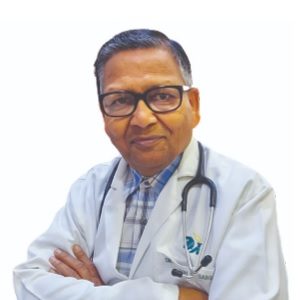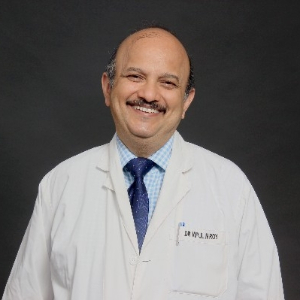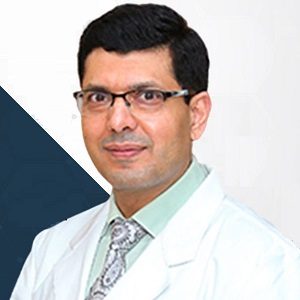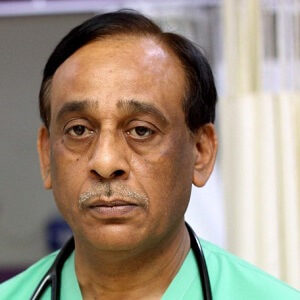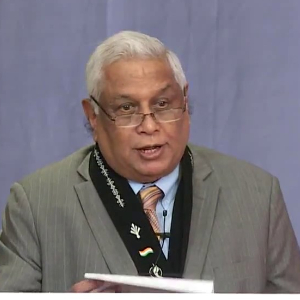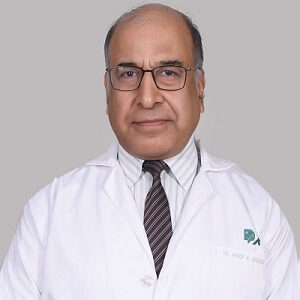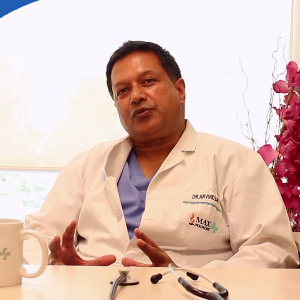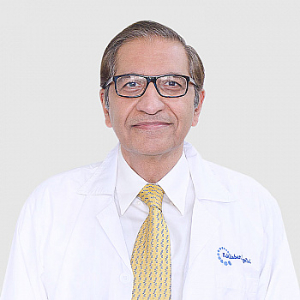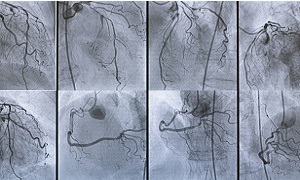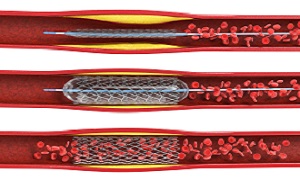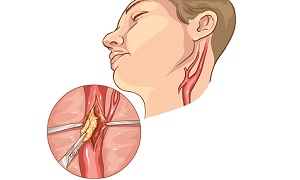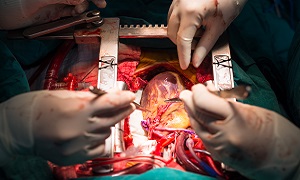Best Doctors in India for Atherosclerosis Treatment
- Interventional Cardiologist, New Delhi, India
- Over 53 years experience
Profile Highlights:
- Dr. Mahesh Chandra Garg is an Interventional cardiologist working at Indraprastha Apollo Hospital in New Delhi with experience of over five decades in the field. He has an interest in Cardiovascular Intervention and Imaging.
- Dr. Garg has specialized in Enhanced External Counterpulsation, Chest Pain Therapies, Diabetic Cardiovascular complexities, and Coronary Artery Bypass Graft Surgery.
- He achieved excellence in invasive cardiology as a result of his participation in specialized training programs and conferences. Dr. Garg provides valuable care for his patients while also encouraging them to adopt a healthy lifestyle.
- He delivered presentations at numerous conferences and published papers in well-known national and international medical journals.
- Interventional Cardiologist, New Delhi, India
- Over 30 years’ experience
Profile Highlights:
- Dr. Vipul Roy is one of the best practicing Cardiologists in India, currently associated with the Indraprastha Apollo Hospital in New Delhi.
- After completing his MD, Dr. Roy travelled to UK where he spent eight years in Liverpool at Regional Adult Cardiothoracic Center.
- In 1994, he came back to India and joined Interventional Cardiology at Escorts Heart Institute in New Delhi as a consultant.
- Pediatric Cardiologist, New Delhi, India
- Over 26 years’ experience
Profile Highlights:
- Dr. Ashutosh Marwah is one of the best child heart specialists in India, having experience of over 26 years.
- He was the former Assistant Director of Jaypee Hospital and is now practicing at Indraprastha Apollo Hospital in New Delhi.
- Dr. Ashutosh Marwah has expertise in treating complex cardiac defects, Interventional & perioperative cardiac catheterizations, dilatation stenting, fetal echocardiography, Aortic Aneurysm, and Stent implantation.
- He has Fellowships in Pediatric Cardiology from reputed hospitals like Escorts Heart Institute, Delhi, and Royal Children’s Hospital, Melbourne, improvised his skills.
- Dr. Marwah published multiple research papers and articles in reputed medical journals of India and abroad. He is also a member of the Lions Club of Dar Es Salaam.
- Interventional Cardiologist, New Delhi, India
- Over 36 years experience
Profile Highlights:
- Dr. K K Saxena is one of the top cardiologists in India, having nearly 36 years of experience in this field.
- He is a senior consultant for interventional cardiology at Indraprastha Apollo Hospital in New Delhi.
- Dr. Saxena diagnoses and treats cardiovascular problems in kids and adults. He is specialized in balloon dilation of the mitral and pulmonary valves, the renal and peripheral arteries, and aortic coarctation.
- Dr. Saxena and his team performed several cardiac catheterizations and pacemaker implantations.
- Prior to joining Apollo hospital, Dr. K K Saxena worked at many national and international hospitals.
- He also completed research in interventional cardiology at the Royal Adelaide Hospital, Australia.
- Paediatric Cardiologist, Chennai, India
- Over 10 years’ experience
Profile Highlights:
- Dr. Muthukumaran C S is one of the finest Heart Specialists in India. He has successfully operated on more than 2500 cardiac catheterizations in children, 1000 AD closures, 250 VSD closures, and 700 PDA closures.
- The Medical practitioner has been associated with various reputed hospitals in India. Dr. Muthukumaran C S has been associated with many hospitals over the course of his illustrious and experienced career.
- Interventional Cardiologist, Mumbai, India
- Over 40 years’ experience
Profile Highlights:
- Dr. Samuel Mathew is famously known as the Father of Angioplasty in India for being the first to introduce the procedure in the country.
- He is a renowned interventional cardiologist and brought in several innovative techniques of angioplasty with coronary Stenting, Carotid Stenting, Percutaneous Bypass, Rotablator Atherectomy, and other such procedures.
- Dr. Mathew holds over 4 decades of experience in interventional cardiology and has performed more than 10,000 angioplasties till date. He also holds the credit for more than 3000 Intra Coronary Stenting and 800 Rotablation cases.
- Cardiothoracic Surgeon and Vascular Surgeon, New Delhi, India
- Over 42 years’ experience
Profile Highlights:
- Dr. Anoop K Ganjoo is one of the best cardiologists & cardiothoracic surgeons in India with a total experience of 42 years.
- Dr. Ganjoo has a rich experience of over two decades in several complicated procedures, like Mitral valve repair and replacement, Peripheral and Coronary angiography & angioplasty, vascular surgery, ICD, diffuse coronary artery disease, Pacemaker, Radiofrequency ablation of arrhythmias, adult Cardiothoracic Surgery, CRT implantation, Balloon valvuloplasty, and PDA device closure.
- Interventional Cardiologist, New Delhi, India
- Over 24 years’ experience
Profile Highlights:
- Dr. Arvind Das is an interventional cardiologist with expertise in all kinds of coronary and non-coronary interventions and electrophysiology.
- Dr. Arvind Das received his fellowship training in pacing and electrophysiology from the renowned Royal Melbourne Hospital in Australia. He has undergone training at Semelweiss Heart Centre, Budapest for Device Implantation.
- Dr. Arvind Das has years of knowledge and experience in various cardiac procedures and provides the best diagnostic and therapeutic treatment for all types of heart diseases and disorders.
- Interventional Cardiologist, Mumbai, India
- Over 45 years’ experience
Profile Highlights:
- Dr. Jamshed Dalal is a well-known Interventional Cardiologist who has over 45+ years of experience and specializes in Adult Interventional Cardiology.
- Dr. Jamshed Dalal is a highly recommended cardiologist for Angiography and performed his first coronary angiography in the year 1978 in UK.
- He specializes in various kinds of coronary and peripheral cardiac procedures and carries immense expertise in Angioplasty, intravascular ultrasound, Pacemaker Implantation, and FFR.
- Interventional Cardiologist, Chennai, India
- Over 22 years’ experience
Profile Highlights:
- Dr. Rakesh P Gopal is an Interventional Cardiologist who has done outstanding work in Interventions for Valvular Heart Disease, Mitral, Aortic, Pulmonary Balloon Valvotomy, and Initiation for Trans Aortic Valve replacement.
- He is the editor of the book Cardiovascular Interventional Trials Update, published by Mathew Foundation and Asia Pacific Interventional Cardiology India Educational Trust.
- Dr. Gopal is a firm believer in the No Re-use idea of disposable materials in interventional procedures.
Best Hospitals in India for Atherosclerosis Treatment
CARE Hospitals, Hyderabad
- City: Hyderabad, India
Hospital Highlights:
- CARE Hospitals were established in the year 2000, by CARE Group.
- The multispecialty hospital has 435 beds, including 120 critical care beds, with an annual inflow of 180000 outpatients and 16,000 in-patients.
- The hospital provides specialty medical services in Cardiology, Cardiothoracic Surgery, Pediatric Cardiology, Pediatric Cardiothoracic Surgery, Neurology, Neurosurgery, Nephrology, and Urology.
- The hospital has the first dual source, 128 slice CT scanner (for high precision cardiac imaging) – the first of its kind in south India.
- The hospital offers a wide range of accommodation facilities for the convenience of its varied patient base, ranging from general wards to super deluxe rooms.
Fortis Hiranandani Hospital, Mumbai
- City: Mumbai, India
Hospital Highlights:
- Fortis Hiranandani hospital was established in 2007.
- The hospital is an advanced tertiary care, multi-specialty hospital equipped with 149 beds.
- The hospital is equipped with a super ICU to provide emergency medical care to critically ill patients.
- The hospital is NABH accredited.
- The critical care facility in the hospital is augmented with the state-of-the-art facilities that facilitate speedier diagnosis and efficient monitoring.
- The hospital provides specialty medical services in cardiology, orthopedic science, pediatric science, neurology, diabetic care, urology, nephrology, ENT, obstetrics, gynecology, cosmetic surgery, bariatric surgery, neuro and spine care.
Fortis Hospital, Anandpur, Kolkata
- City: Kolkata, India
Hospital Highlights:
- Fortis Hospital, Anandapur, Kolkata is a world-class super-speciality equipped with the latest technologies in the medical world.
- The hospital is NABH accredited.
- This state-of-the-art facility specializes in cardiology and cardiac surgery, urology, nephrology, neurosciences, orthopaedics, digestive care, emergency care and critical care.
- The hospital, governed by integrated Building Management System (IBMS), has a pneumatic chute system, for quick vertical and horizontal transportation between floors, facilitating speedy transfer of patient specimens, documents, reports, and medicines to the concerned departments.
- The hospital also has a nephrology department with over 28 advanced dialysis units.
Fortis Hospital Banerghatta, Bengaluru
- City: Bengaluru, India
Hospital Highlights:
- Fortis Hospital Bannerghatta, Bengaluru was established in 2006.
- The hospital is a 276 bedded multi-specialty tertiary care facility.
- The hospital specializes in cutting-edge medical technology and dedicated patient care services.
- The hospital is equipped with state-of-the-art technologies like trans-radial angioplasty, trans-abdominal cardiac surgery, and computerized TKR navigation surgery.
- The hospital provides specialty medical services in cardiology, cardiac surgery, orthopedics, neurology, neuro-surgery, GI, and Minimal Access Surgery (MAS).
Fortis Hospital, Malar, Chennai
- City: Chennai, India
Hospital Highlights:
- Fortis Malar was established in 1992 and was formerly known as Malar Hospital.
- The hospital specializes in cutting-edge medical technology and dedicated patient care services.
- The hospital is multi-specialty, tertiary care facility with 180 beds.
- The hospital offers comprehensive medical care in specialties such as cardiology, cardio-thoracic surgery, neurology, neurosurgery, orthopedics, nephrology, gynecology, gastroenterology, urology, pediatrics, and diabetes.
Gleneagles Global Hospital, Parel, Mumbai
- City: Mumbai, India
Hospital Highlights:
- Gleneagles Global Hospital The 450-bed facility comprises of 17-stories, housing state-of-the-art infrastructure, and advanced medical care facilities.
- The hospital offers end-to-end clinical, surgical, and diagnostic services. It is equipped with a team of eminent medical professionals aided by qualified nurses and medical staff
- The Hospital offers advanced Endoscopic procedures, Hepatobiliary and Liver Surgeries, Surgical and Medical Gastroenterology, Bariatric Surgery, and Robotic surgery.
- The hospital is a center of excellence for Orthopedics, Joint Replacement, Knee Replacement, and Hip Replacement surgery.
Atherosclerosis
Atherosclerosis is a condition which causes the arteries to narrow and harden. This leads to your arteries getting blocked, putting your blood flow at risk. It is usually caused by the build-up of fats, cholesterol and other such substances in and on your artery walls.
Atherosclerosis is a type of arteriosclerosis, though the terms are used interchangeably sometimes. The plaque can burst, which can trigger a blood clot. Atherosclerosis is often considered a heart problem, but it might affect any part of your body. This condition is preventable as well as treatable.
Causes
Plaque buildup as well as subsequent hardening of the arteries leads to the blood flow in the arteries being restricted, which prevents your organs and tissues from getting the required oxygenated blood. Some common causes of this condition include:
- High Cholesterol- Cholesterol is a waxy, yellow substance that is found naturally in the body as well as in some foods you consume. When the cholesterol level in your blood is too high, it can lead to the clogging of your arteries. It becomes a hard plaque that restricts or blocks blood circulation to your heart as well as other organs.
- Diet- It is also quite important to eat a healthy diet. An overall healthy diet should include a wide range of fruits and vegetables, whole grains, dairy products with low fat, nuts and legumes, etc.
- Aging- As one ages, their heart and blood vessels work harder to pump as well as receive blood. Your arteries may weaken and become less elastic, which makes them more susceptible to plaque buildup.
Symptoms
Mild atherosclerosis doesn’t usually have any symptoms. Usually, symptoms occur only after an artery is so narrowed or clogged that it is unable to supply adequate blood to the organs and tissues. Sometimes a blood clot can completely block blood flow or it might even break apart and can trigger a heart attack or stroke. Symptoms depend on which part of your body is affected.
- If you have atherosclerosis in your heart arteries, you might show symptoms such as chest pain or pressure.
- If you have atherosclerosis in the arteries which lead to your brain, you might have signs and symptoms such as sudden numbness or weakness in your arms and legs, difficulty in speaking, temporary loss of vision in an eye or your face muscles drooping. These signal a transient ischemic attack and if it is left untreated, it might lead to a stroke.
- If you are having atherosclerosis in the arteries in your arms and legs, you might show symptoms of peripheral artery disease, like leg pain when walking.
- If you have atherosclerosis in the arteries which lead to your kidney, you can develop high blood pressure or maybe even kidney failure.
Diagnosis
Your doctor first performs a physical exam to check for signs of atherosclerosis. They will check if your pulse is weakened or if there are any signs of an aneurysm, which is an abnormal or widening of an artery due to weakness of the arterial wall, slow wound healing, which can indicate a restricted blood flow.
A cardiologist might listen to your heart to check if there are any abnormal sounds. They will be listening for a whooshing noise, which can indicate that an artery is blocked. Your doctor will be ordering more tests if they feel you might have atherosclerosis.
These tests can include:
Blood test
Doppler ultrasound
Ankle-brachial index
Angiogram
Stress test
MRA
Electrocardiogram
Treatment
Medications
There are various drugs that can slow or reverse the effects of atherosclerosis. Some common choices are:
- Cholesterol medications- These kinds of medications are used to lower the low-density lipoprotein cholesterol aggressively, as this may stop or even reverse the buildup of fatty deposits in your arteries. Boosting your high-density lipoprotein cholesterol can however help. Your doctor will guide you in choosing from a range of cholesterol medications.
- Beta-blocker medications- These kinds of medications are commonly used for coronary artery disease. They help in lowering your heart rate as well as your blood pressure and reduces the demand on your heart as well as relieving symptoms of chest pain. They can also reduce your risk of having a heart attack or heart rhythm problems.
- Anti-platelet medications- Your doctor might prescribe you anti-platelet medications like aspirin, to help reduce the likelihood that platelets will clump in narrowed arteries and form a blood clot which will even lead to further blockage.
- Angiotensin-converting enzyme (ACE) inhibitors- These medications might help to slow the progression of atherosclerosis by lowering your blood pressure and they also produce other beneficial effects on your heart arteries. ACE inhibitors can help in reducing the risk of recurrent heart attack as well.
- Calcium channel blockers- These medications can lower blood pressure can also be used for treating angina.
- Water pills (diuretics)- Diuretics can help in lowering blood pressure, as high blood pressure increases the risk of having atherosclerosis.
- Other medications- Your doctor might be suggesting some other medications to control specific risk factors for atherosclerosis, like diabetes.
Surgical procedures
Aggressive treatment can be needed sometimes to treat atherosclerosis. If you are having severe symptoms or a blockage that threatens muscle or skin tissue survival, you might be a candidate for a surgical procedure such as:
Angioplasty and stent placement
During angioplasty and stent placement, your doctor inserts a long and thin tube called a catheter into your blocked or narrowed part of the artery. A second catheter with a deflated balloon on its tip is next passed through the catheter to the narrowed area. Next, the balloon is inflated, compressing the deposits against the artery walls. To help in keeping the artery open, a mesh tube is usually left in the artery.
Endarterectomy
Fibrinolytic therapy
If you have an artery that is blocked by a blood clot, your doctor might use a clot-dissolving drug in order to break it apart.
Bypass surgery
Risk factors
Hardening of the arteries can occur over time. There are quite a few factors which can increase the risk of developing atherosclerosis, which includes:
- High blood pressure
- High cholesterol
- Obesity
- Diabetes
- Smoking and using any such tobacco
- Having a family history with heart disease
- An unhealthy diet
- Lack of regular exercise
Complications
Depending on which arteries are blocked, atherosclerosis can lead to several complications, which can include:
- Coronary artery disease- When atherosclerosis narrows the arteries which are close to your heart, it can lead you to coronary artery disease. This can cause chest pain or a heart attack or even heart failure.
- Carotid artery disease- When atherosclerosis narrows your arteries close to your brain, this might lead you to develop carotid artery disease, which can lead to a transient ischemic attack or even a stroke.
- Peripheral artery disease- When atherosclerosis narrows down your arteries in the arms or legs, this can lead you to develop certain problems which are termed as peripheral artery disease. This can make you less sensitive to heat and cold and can increase your chances of burns or frostbites. Although it is rare, in some cases, poor circulation in your arms and legs can also cause tissue death.
- Chronic kidney disease– Atherosclerosis can also cause the arteries which lead to your kidneys to narrow, which will prevent oxygenated blood from reaching them. This can affect your kidney function over time keeping waste from exiting your system.
- Aneurysms- Atherosclerosis can also lead to aneurysms, which is a serious complication that can occur anywhere in the body. An aneurysm is basically a bulge in the wall of the artery. Many people with aneurysms usually show no symptoms. If pain and throbbing in the area of aneurysm occur, it is declared as a medical emergency. If an aneurysm bursts, it can cause life-threatening internal bleeding.
Prevention
Preventive measures can also help one against atherosclerosis. Quitting smoking, regular exercise and maintaining a healthy weight, eating healthy food can help a great deal

